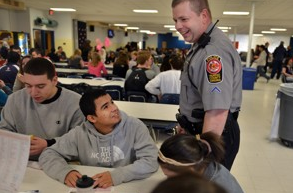News & Announcements
- Details
- Written by Joshua Wachtel
This video is from American Humane, which formerly housed the National Center on Family Group Decision Making, now a part of the Kempe Center. The video describes the Family Group Decision Making process, a restorative practice for engaging families to find their own solutions to problems.
- Details
- Written by Joshua Wachtel
Denver, Colorado, is in the national news this week. At a time when some are calling to beef up police security in schools, Denver is limiting by contractual agreement the role of police in schools, and requiring training for those police who will remain so that they do not wind up criminalizing more students. The approach calls for restorative justice. The Washington Post reports:
As communities across the country beef up police presence in schools, Denver may become a national counterpoint Tuesday, when officials plan to sign an agreement to limit the role of law enforcement at the city’s schools — a move that could mean fewer students will face arrest or citation for disciplinary infractions.
- Details
- Written by Joshua Wachtel
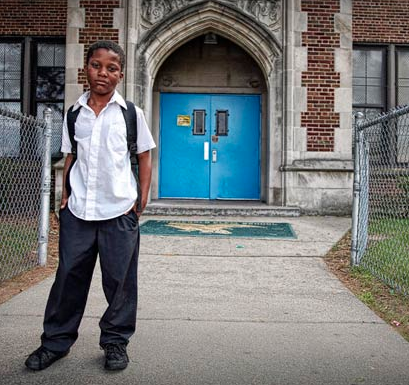 Creative Commons / Roche Photo
Creative Commons / Roche Photo
Melinda Clynes, has written an article for Michigan Night Light (whose tag line is "Illuminating Solutions for Children") titled "Repairing Detroit Through Restorative Practices." Clynes begins by quoting Henry McClendon, Michigan Regional Coordinator for the IIRP:
According to Henry McClendon, program officer at The Skillman Foundation, Detroit doesn’t have a crime problem; we have a relationship problem.
He believes that crime is the symptom, while broken relationships are the problem.
When crime happens, we treat the symptom. We ask what law was broken, who broke it, and what kind of punishment it deserves. It keeps victim and offender apart.
The same thing happens in schools. Students get in trouble, and they’re suspended or expelled. Once back at school, the perpetrator is still angry; the victim is still angry – or afraid. And, the suspended student’s chance of graduating on time begins to buckle.
- Details
- Written by Joshua Wachtel

Last week I posted a link to a story about a school district that invited representatives of local churches to learn about its implementation ofrestorative practices. Today I have news of a program I recently learned about that involves a partnership between faith congregations and organizations that provide restorative services to communities. Shalem Mental Health Network has the news on its web site:
Shalem and the International Institute of Restorative Practices (IIRP) – Canada have embarked together on the Hosting Project, where faith communities of all faiths – Christian, Muslim, Hindu, Sikh, Jewish and other – act as hosts of restorative processes that happen in their local communities. Hosting connects deeply with themes of hospitality and sanctuary that are central to all of the world’s major religions.
- Details
- Written by Joshua Wachtel
 In the coming year IIRP will be offering three different 4Day Events in a host of locations nationwide.
In the coming year IIRP will be offering three different 4Day Events in a host of locations nationwide.
- Basic Restorative Practices Four days of professional development, exploring the full range of restorative practices. Day 1: Introduction to Restorative Practices. Day 2: Using Circles Effectively. Day 3: Facilitating Restorative Conferences. Day 4: Family Engagement.
- Restorative Responses to Grief, Trauma and Adversity This event will teach you how to employ restorative practices such as restorative conferences to respond effectively to serious incidents. Acquire valuable skills for responding to trauma and grief. Explore the grieving process from a fresh and practical perspective. Address the essential issue of self-care. View and discuss videos of powerful true stories.
- Restorative Leadership Development: Authority with Grace A highly participatory and engaging experience for managers, supervisors, teachers, parents or anyone in a position of responsibility or authority. Over the four days you will learn the principles of restorative leadership, an engaging, collaborative and effective way to exercise your authority.
- Details
- Written by Joshua Wachtel
A creative application of restorative justice from Canada.
- Details
- Written by Joshua Wachtel
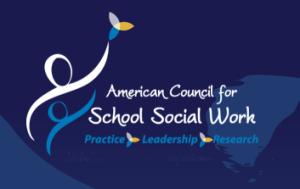 IIRP instructor Steve Korr will be presenting the first day's keynote, "Restorative Practices: A Systemic Model for Change in Schools," at the American Council for School Social Work Conference, which takes place February 18-19, 2013, at Tulane University in New Orleans, Louisiana, USA. Following the keynote, Steve will also be doing an interactive workshop on "Restorative Practices in Schools."
IIRP instructor Steve Korr will be presenting the first day's keynote, "Restorative Practices: A Systemic Model for Change in Schools," at the American Council for School Social Work Conference, which takes place February 18-19, 2013, at Tulane University in New Orleans, Louisiana, USA. Following the keynote, Steve will also be doing an interactive workshop on "Restorative Practices in Schools."
Steve's keynote is an indication of how restorative practices is gaining credence nationally. Steve has been involved in implementing whole-school change through restorative practices nationwide and will share his experiences with this large, important group of school professionals who are on the front lines dealing with mental health and violence issues in schools. The ACSSW wanted a keynote on restorative practices because it is becoming known as an evidence-based practice.
More information about the ACSSW conference can be found here.
- Details
- Written by Joshua Wachtel
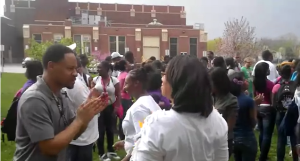 Balloon release at Fenger High School, from video uploaded by Robert SpicerRobert Koehler's column this week for the Chicago Tribune focuses on a school transformation at Fenger High School in Chicago.
Balloon release at Fenger High School, from video uploaded by Robert SpicerRobert Koehler's column this week for the Chicago Tribune focuses on a school transformation at Fenger High School in Chicago.
"Fenger used to have a terrible reputation, which reached its nadir a little over three years ago when one of its students, Derrion Albert, was caught in the middle of a gang melee on his way home from school and beaten to death with two-by-fours," writes Koehler. "His murder was caught on a cellphone video and became international news."
But now students are taught skills to handle conflict, alternatives to violence, which are making a huge difference:
While meanness, disrespect, misunderstanding and temper flare-ups are part of life everywhere, in some neighborhoods they can be life-or-death issues. Teaching social skills, empathy, respect and the ability to listen are absolutely crucial. And it can’t be done half-heartedly, said Robert Spicer, Fenger’s Culture and Climate coordinator and the person who facilitates the school’s peer jury program. “Lives are at stake.”
- Details
- Written by Joshua Wachtel
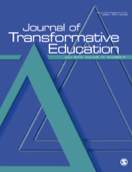 Two IIRP assistant professors, John Bailie and Craig Adamson, have co-authored an article, "Education Versus Learning: Restorative Practices in Higher Education," which has been published in the Journal of Transformative Education. John Bailie is also IIRP's Director of Continuing Education. Craig Adamson is Executive Director of Community Service Foundation and Buxmont Academy, IIRP's model programs that serve at-risk youth in eastern Pennsylvania using restorative practices.
Two IIRP assistant professors, John Bailie and Craig Adamson, have co-authored an article, "Education Versus Learning: Restorative Practices in Higher Education," which has been published in the Journal of Transformative Education. John Bailie is also IIRP's Director of Continuing Education. Craig Adamson is Executive Director of Community Service Foundation and Buxmont Academy, IIRP's model programs that serve at-risk youth in eastern Pennsylvania using restorative practices.
- Details
- Written by Joshua Wachtel
 Representatives of school and church meet over breakfast in Susquehanna Township. Photo by M. Diane McCormick for PennLive.com
Representatives of school and church meet over breakfast in Susquehanna Township. Photo by M. Diane McCormick for PennLive.com
The Susquehanna Township (Pennsylvania) School District has not only been implementing restorative practices district-wide. They are also reaching out to the wider community to involve them in the changes happening in the school and expand their efforts. This article from the the Harrisburg Patriot News/PennLive.com describes how for the first time ever the district invited leaders of local churches to attend "a 'faith-based breakfast' at [the school's] administrative building." IIRP instructor Steve Korr made a presentation during the breakfast about restorative practices and the district's efforts.
“This is a nice way to network with the community, and the churches in the area are partners with us,” [Superintendent Susan M.] Kegerise said. “We have to cultivate that. Their parishioners are our students.”
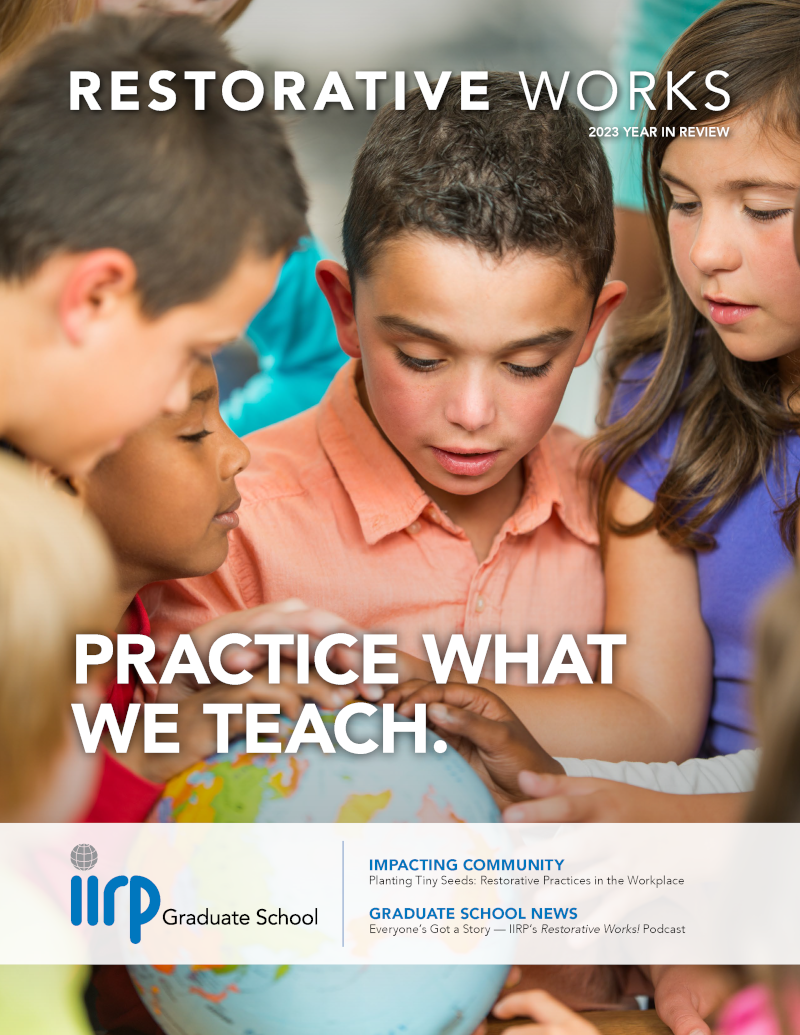
Restorative Works Year in Review 2023 (PDF)
All our donors are acknowledged annually in Restorative Works.

